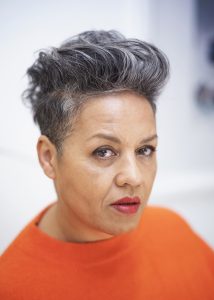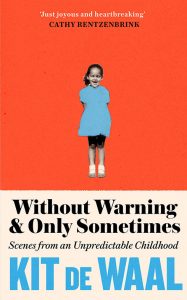November 2022
Celebrated author Kit de Waal was among the speakers at the 2022 Bridport Literary Festival, and we had the huge joy of catching up with her in the pod…

The Bridge: For BridLit you’ll be talking about your latest book, Without Warning & Only Sometimes [pictured], which is a childhood memoir. The process of writing a memoir is fascinating – how much of what you describe was still fresh in your mind, and how much did you research by talking to family members and childhood friends?
Kit de Waal: Most of it was fresh in my mind. I am the custodian of the family archive just by the fact that I have a very good memory. I did speak to my brother and sisters occasionally for their remembrances of certain events but usually I have it all to hand.
 TB: Do you have a writing room? And a daily writing routine?
TB: Do you have a writing room? And a daily writing routine?
KdW: I do have a writing room – it’s at the back of my flat overlooking a little patio garden. It has lots of windows and wonderful light. It can be a bit chilly but it’s worth it for the peace and quiet. I don’t have a daily writing routine. Sometimes I have nothing to say; other times I can write almost non-stop for a week.
TB: You’ve written about your Jehovah’s Witness mother and the lack of books (other than the Bible) in your childhood home. What made you start reading novels as an adult? How did it change your inner life?
KdW: I started reading in my early twenties; I wasn’t interested in books before that. I only really started because I couldn’t sleep and needed something to keep me company at night. What I found in books was other worlds and other ways to have lived. I found that just by the power of words I could leave where I was and be in another country in another space and time and in another’s skin. It was a wonderful discovery.
TB: You’re passionate about increasing opportunities for working-class writers, and have created a scholarship to this end. What advice would you give to aspiring writers who aren’t fortunate enough to have this kind of financial support but who want to tell their story?
KdW: Pen and paper is all you need to start, or a laptop – even a shared one. Start somewhere and take your work seriously. Read about writing. Read writers you admire and deconstruct their work. Watch YouTube interviews on the craft – there are loads of free ones.
There are also things like MOOCs (Massive Open Online Courses) that do free creative writing courses, as do some community colleges. Look around for support and help and also consider starting your own writing group.
TB: You have won the Bridport Prize twice with your flash fiction, and you have a family connection to the town. What does Bridport mean to you?
KdW: I first came to Bridport maybe 30 years ago when my sister Kim moved to Dorset. It’s a beautiful town that I’ve watched grow and develop and I even considered buying a holiday home here years ago before the whole world realised how lovely it is.
TB: Which other contemporary writers do you most admire, and why?
KdW: There are too many to mention. Maggie O’Farrell, obviously, because she’s just so good at storytelling. Liz Nugent, a crime writer from Ireland who always keeps you up too late with her plot twists, and Donal Ryan because of his turn of phrase and sheer brilliance on the page.
TB: Your memoir was published this August. Have you already started your next writing project? If so, can you tell us a bit about it?
KdW: I can’t say any more other than it’s about five people and how their lives collide on a single day.
Kit de Waal’s first book, My Name Is Leon, was the Irish Novel of the Year 2017 and was shortlisted for the Costa Book Awards for a first novel. She is the founder of the Kit de Waal Creative Writing Scholarship, launched in 2016, which funds a place at Birkbeck, University of London, for a writer from a disadvantaged background.
www.kitdewaal.com